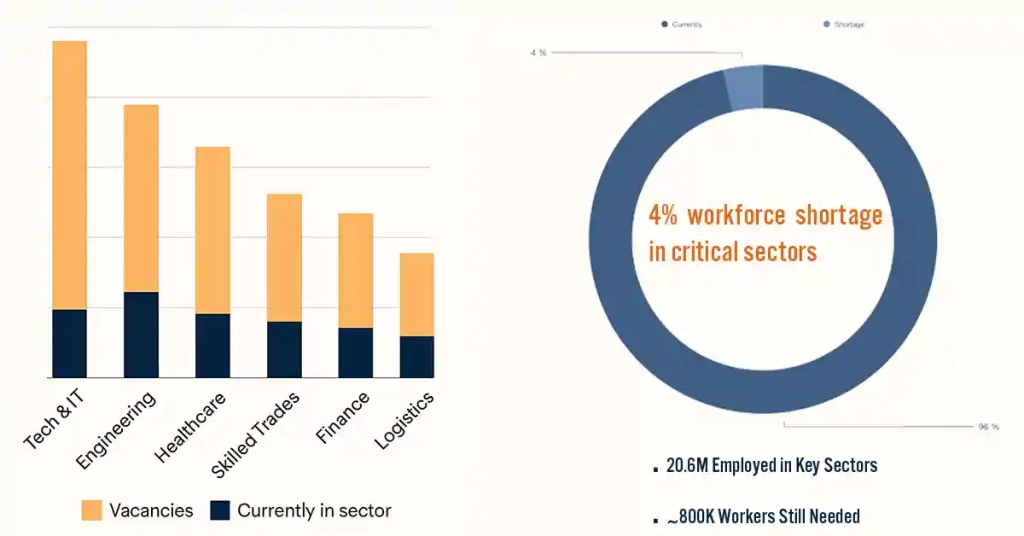Job Opportunities in Germany: Best Careers for Skilled Workers and Young Professionals
- Job Opportunities in Germany: Best Careers for Skilled Workers and Young Professionals
- Why Germany?
- Most In Demand Industries in Germany
- Jobs in Germany for Young Professionals
- Jobs in Germany for Unskilled Workers
- How to Find a Job in Germany as a Foreigner
- Type of Visas to Find Jobs in Germany
- Salaries in Germany (By Sector)
- Challenges Foreign Workers Face in Germany
- Tips for Passing Job Interviews in Germany
- Overview of German Work Contracts and Probation Periods
- Path to Permanent Residency Through Employment
- List of Official Shortage Occupations in Germany
- Top German Cities for Getting a Job (by Industry)
- Job Types vs. Visa Options: Quick Comparison
Job opportunities in Germany continue to attract skilled professionals, young graduates, and even unskilled laborers from around the world.
As the largest economy in the European Union with a GDP exceeding €4.5 trillion, Germany offers one of the most stable and structured labor markets in Europe. In 2025 alone, over 1.7 million job vacancies have been reported, especially in IT, healthcare, engineering, and skilled trades.
With a clear demand for foreign talent—particularly those with technical qualifications, digital expertise, and language adaptability—Germany remains one of the most promising destinations for international career growth.
This complete guide to job opportunities in Germany explains the industries hiring most actively, the skills in demand, how to find jobs, and what expats need to know about the visa and relocation process.
Whether you’re a young professional aiming for a corporate role or a tradesperson looking for stable work, Germany might have the right path for you.
Why Germany?
By working in Germany, the country offers a mix of high living standards, strong worker protections, and competitive salaries across a range of professions. What sets the German job market apart is its structured, stable environment and clear demand for both highly skilled and support roles.
Key Benefits of making a career in Germany:
- Competitive salaries with structured pay scales
- 20–30 days of paid vacation annually
- Employer-subsidized health insurance
- Strong labor protections and job security
- Opportunities to transition from temporary work to permanent residency
- Germany’s location within the EU makes it easy to travel and build a European network
For young professionals especially, Germany presents a chance to build a sustainable career with long-term prospects, even as English-speaking roles increase in tech, engineering, and finance.
FUN FACT
Blue Card Salary Threshold
While the standard salary minimum is €45,300, professionals in shortage fields—like nursing, engineering, and IT—can qualify with offers as low as €41,041 per year.
Most In Demand Industries in Germany
Germany’s economic success is built on its industrial strength and digital transition. The government is also actively issuing work visas to foreign professionals to counteract labor shortages and population decline.

Information Technology and Software Development
Germany’s digital economy is booming, and tech startups as well as traditional corporations are on the hunt for:
- Software developers and backend engineers
- IT security specialists
- AI and machine learning engineers
- Data analysts and cloud architects
Many companies in Berlin, Munich, and Hamburg offer English-speaking environments, making tech the most accessible field for international workers.
Engineering and Manufacturing
As the home of global engineering giants like Siemens, Bosch, and BMW, Germany has an ongoing need for engineers across sectors:
- Mechanical and automotive engineers
- Electrical and civil engineers
- Process and industrial design experts
- Mechatronics and robotics specialists
STEM graduates with practical experience can find promising roles, especially in southern regions like Bavaria and Baden-Württemberg.
Healthcare and Nursing
Germany’s aging population has created urgent demand in the healthcare sector:
- Registered nurses (with recognition of foreign degrees)
- Elderly care workers
- Medical assistants and technicians
- General practitioners and specialists (if licensed in Germany)
Foreign healthcare workers must undergo credential recognition (Anerkennung) but enjoy secure contracts and high job stability once approved.
Skilled Trades and Construction
Tradespeople are among the most overlooked but highly needed groups in Germany. Common roles include:
- Electricians
- Plumbers
- HVAC technicians
- Carpenters and metal workers
Vocational training (Ausbildung) is highly valued, and non-EU workers can apply for visas if they can prove qualifications and job offers.
Logistics and Warehouse Jobs
Germany’s central location in Europe makes it a logistics powerhouse. The following positions are regularly advertised:
- Forklift operators
- Warehouse workers
- Truck drivers (with EU license)
- Delivery and logistics coordinators
These roles often fall into the category of unskilled or semi-skilled jobs, but provide steady employment with benefits, especially for expats seeking entry into the labor market.
Finance, Business, and Sales
With Frankfurt as a financial hub, skilled professionals in business fields are increasingly welcomed:
- Accountants and auditors
- Financial analysts
- Sales managers and key account executives
- Procurement and logistics planners
Fluency in German is often required, but international companies and startups offer exceptions for high-performing professionals.
FUN FACT
Jobs in Germany Without Degree
Germany doesn’t require a university degree to issue skilled worker visas. If you have a recognized trade qualification—like electrician, HVAC, or mechanic—you’re eligible to work and stay long-term.
Jobs in Germany for Young Professionals
Young professionals—especially graduates with degrees in STEM, business, or digital fields—will find a particularly fertile job market in Germany.
Best Fields for Young Professionals:
- Software engineering and front-end development
- UX/UI design and digital marketing
- Civil and mechanical engineering
- Renewable energy technologies
- Finance and fintech startups
- AI and data science
- Consulting and project management
Berlin, Munich, Hamburg, and Düsseldorf are hotspots for these roles, with increasing numbers of companies offering hybrid or remote work setups.
Advantages for Young Workers:
- Fast-track Blue Card eligibility if salary thresholds are met
- Access to public pension and healthcare from day one
- Opportunities to transition to permanent residence after 33 months (or 21 months with B1-level German)
- Cultural openness in startup ecosystems and urban hubs
Jobs in Germany for Unskilled Workers
While Germany’s focus is on skilled immigration, there are still pathways for unskilled or low-skilled workers.
Common Jobs for Unskilled Workers:
- Cleaning and facility services
- Food production and packaging
- Warehouse sorting and delivery
- Agriculture and seasonal harvest work
- Hospitality (housekeeping, kitchen help, dishwashing)
Most of these roles require some basic German proficiency and willingness to work shift-based or physically demanding jobs. While the pay is lower than in skilled professions, benefits like healthcare and legal work status make these roles viable stepping stones.
How to Find a Job in Germany as a Foreigner
Finding a job in Germany requires a combination of strategy, preparation, and knowing where to look.
Top Platforms for Job Search:
- LinkedIn (especially for international roles)
- StepStone, Indeed, and Monster.de
- Make it in Germany (government-backed portal)
- XING (the German alternative to LinkedIn)
- Job sections of company websites (especially for large German employers)
Pro Tips:
- Use keywords in both English and German
- Customize your CV to the German format (1–2 pages, no fluff)
- Include a motivation letter (Anschreiben), especially for local companies
- Showcase visa or Blue Card eligibility in your application
- Apply early, as hiring timelines can be slow due to bureaucracy
Type of Visas to Find Jobs in Germany
Your visa pathway depends on your citizenship, skill level, and job type.
For Skilled Workers:
- EU Blue Card: Fast-track visa for university graduates with a job offer paying above €45,300 (or €41,041 in shortage occupations)
- Skilled Workers Visa: For vocationally trained professionals with recognized qualifications and a job offer
For Unskilled or General Workers:
- Job Seeker Visa: 6-month visa to search for employment while in Germany (requires proof of funds and degree/qualification)
- Seasonal Worker Programs: For agriculture and hospitality, often sponsored by employers
- Working Holiday Visa: Available for citizens of countries like Australia, New Zealand, Canada, and a few others (under age 30 or 35)
Key Requirements:
- Valid passport
- Employment contract or offer
- Proof of qualifications and recognition (if applicable)
- Health insurance
- German language skills (A2–B1 often required for non-academic roles)
Salaries in Germany (By Sector)
Understanding average salary expectations helps you evaluate offers and negotiate confidently. Here’s what you can expect by sector:
| Sector | Average Gross Annual Salary |
|---|---|
| IT & Software Development | €60,000 – €85,000 |
| Engineering | €55,000 – €80,000 |
| Nursing & Healthcare | €37,000 – €50,000 |
| Logistics & Transport | €30,000 – €45,000 |
| Skilled Trades | €33,000 – €48,000 |
| Finance & Accounting | €50,000 – €75,000 |
| Hospitality & Tourism | €24,000 – €32,000 |
Salaries in Germany vary by region, company size, and experience. Southern Germany and major cities tend to pay more, especially for roles in engineering and tech.
Challenges Foreign Workers Face in Germany
Despite its opportunities, working here comes with some hurdles:
- Language barrier: Many roles outside of tech or international companies require at least B1-level German. Government processes and communication are often not English-friendly.
- Cultural differences: German workplaces are formal, direct, and value punctuality and process. “Small talk” is rare, and feedback is often blunt.
- Recognition of qualifications: Non-EU degrees or certifications may need official recognition (Anerkennung), which can be time-consuming.
- Bureaucracy: Paperwork, Anmeldung, and visa processing can be overwhelming without proper guidance.
Being aware of these challenges helps expats prepare mentally and practically for smoother integration.
FUN FACT
Visa Benefits for STEM Graduates
STEM degree holders (Science, Tech, Engineering, Math) benefit from relaxed Blue Card salary thresholds and easier job market access—even with minimal German.
Tips for Passing Job Interviews in Germany
Success in a German job interview depends on preparation, structure, and professionalism. Key tips include:
- Be punctual: Arriving even 5 minutes late is a red flag in most German companies.
- Dress conservatively: Business formal or business casual is the norm, depending on the industry.
- Stick to facts: Avoid exaggeration. Emphasize proven results and your ability to integrate into a team.
- Expect technical questions: Be prepared to demonstrate your skills or answer scenario-based queries.
- Ask questions: Inquiring about the role, team structure, and onboarding shows initiative.
If applying in English, ask in advance whether German will be used during any part of the interview process.
Overview of German Work Contracts and Probation Periods
Understanding the structure of a German employment contract is essential:
- Probation period (Probezeit): Usually 6 months. Termination by either party requires only 2 weeks’ notice.
- Fixed-term vs. permanent: Many roles start with a 12- or 24-month contract, often transitioning to permanent status.
- Working hours: Standard is 35–40 hours/week, with overtime compensated or converted into time off.
- Notice periods: After probation, the notice period is typically 4 weeks, increasing with tenure.
Contracts are detailed and legally binding. Always request an English version if available and review vacation days, bonuses, and termination clauses carefully.
Path to Permanent Residency Through Employment
Germany allows foreign workers to transition from temporary residence to permanent status through structured legal routes:
Blue Card Holders:
- Can apply for permanent residency after 33 months
- If B1-level German is proven, the timeframe shortens to 21 months
Skilled Worker Visa Holders:
- Can apply for permanent residency after 4 years of continuous employment and contributions to the pension system
Other Requirements:
- Proof of income and health insurance
- No significant gaps in employment
- Clean legal record
- German language proficiency (at least A2, ideally B1)
This path makes Germany attractive for long-term career planners who seek both job security and residency stability.
List of Official Shortage Occupations in Germany
Germany officially recognizes certain professions as “shortage occupations” (Engpassberufe), making it easier for non-EU professionals to secure visas and recognition.
Examples of Shortage Occupations:
- Nurses and elderly care professionals
- IT specialists (developers, cybersecurity experts)
- Electrical engineers and technicians
- Construction workers and civil engineers
- Metalworkers and welders
- Mechatronics technicians
- Truck drivers (with EU license)
- Early childhood educators
These roles benefit from lower salary thresholds for Blue Card eligibility and faster visa processing, making them highly strategic entry points.
Top German Cities for Getting a Job (by Industry)
Different regions in Germany specialize in different sectors. Here’s where to look based on your field:
| Industry | Top Cities |
|---|---|
| Tech & Startups | Berlin, Hamburg, Munich |
| Engineering & Automotive | Stuttgart, Munich, Wolfsburg |
| Finance & Banking | Frankfurt, Düsseldorf |
| Healthcare | Cologne, Berlin, Hanover |
| Logistics | Hamburg, Bremen, Leipzig |
| Manufacturing | Nuremberg, Mannheim, Dresden |
| Hospitality | Berlin, Munich, Heidelberg |
While Berlin is the most expat-friendly, southern Germany typically offers higher salaries—especially in engineering and manufacturing.
Job Types vs. Visa Options: Quick Comparison
Here’s a simplified chart to match job categories with the right visa type:
| Job Type | Suitable Visa Type | Language Needed | Path to Residency |
|---|---|---|---|
| Software Developer | EU Blue Card | English | 21–33 months |
| Nurse | Skilled Worker Visa | B1 German | 4 years |
| Warehouse Worker | General Employment Visa | A2–B1 German | 4 years |
| Engineer | EU Blue Card | English/German | 21–33 months |
| Hospitality Staff | Seasonal/Skilled Visa | A2–B1 German | 4 years |
| Truck Driver | Shortage Occupation Visa | A2 German | 4 years |
| Financial Analyst | Blue Card / Skilled Visa | English/German | 33 months |
Choosing the right visa route depends on your job, qualifications, and language skills. Early planning and accurate paperwork make the process much smoother.
Is Germany the Right Place for Your Career?
Germany offers one of the most structured and opportunity-rich job markets in Europe—especially for young professionals and skilled workers. The country’s economic stability, strong social safety net, and growing demand for talent create a compelling case for relocation.
While the process can feel bureaucratic, Germany’s clear guidelines, legal protections, and focus on long-term integration make it a sustainable choice for those seeking career growth and life security.
Whether you’re building a tech career in Berlin, launching your engineering journey in Stuttgart, or entering the trades in Frankfurt, job opportunities in Germany are diverse and growing—and the demand for foreign talent is only increasing.
Research sources used in this article:
How informative was this article?
Click on a star to rate it!
We are sorry that this post was not useful for you!
Let us improve this post!
What is missing in the article?















